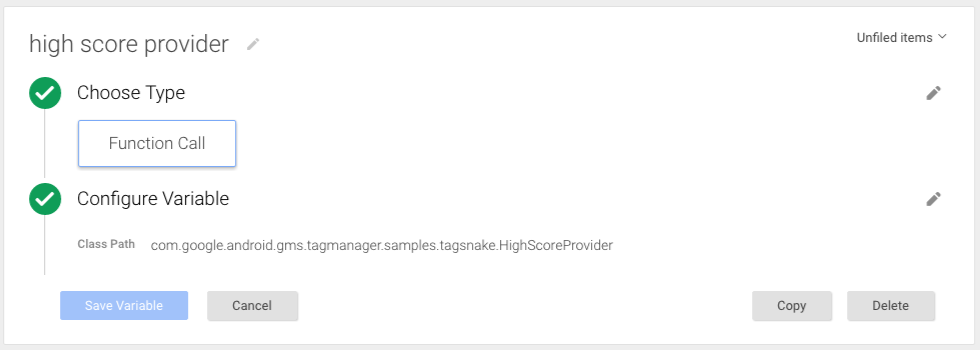Aby rozszerzyć funkcjonalność Menedżera tagów Google, możesz dodać zmienne wywołania funkcji i tagi wywołania funkcji. Zmienne wywołania funkcji umożliwiają przechwytywanie wartości zwracanych przez wywołania zarejestrowanych wcześniej funkcji. Tagi wywołania funkcji umożliwiają wykonywanie wcześniej zarejestrowanych funkcji (np. w celu aktywowania działań na potrzeby dodatkowych narzędzi pomiarowych i remarketingowych, które nie są obecnie obsługiwane przez szablony tagów w Menedżerze tagów).
Dodawanie tagów i zmiennych niestandardowych
Aby dodać tag niestandardowy lub zmienną niestandardową za pomocą wywołania funkcji:
Zaimplementuj klasę rozszerzającą klasę
com.google.android.gms.tagmanager.CustomTagProviderlubcom.google.android.gms.tagmanager.CustomVariableProvider:import android.support.annotation.Keep; import java.util.Map; @Keep public class HighScoreProvider implements com.google.android.gms.tagmanager.CustomVariableProvider { @Override public String getValue(Map<String, Object> map) { synchronized (HighScoreProvider.class) { return ((Long)sHighScore).toString(); } } private static long sHighScore = 0; public static void recordScore(long score) { synchronized (HighScoreProvider.class) { sHighScore = Math.max(score, sHighScore); } } }Jeśli używasz ProGuard, upewnij się, że nazwy klas i metod nie są zaciemnione. Aby to określić, użyj adnotacji w Keep.
W interfejsie internetowym Menedżera tagów Google używaj pełnej nazwy kwalifikowanej klasy, aby konfigurować tagi i zmiennych:
